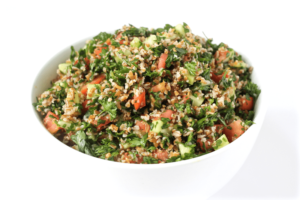Ordering Vegan Dishes in Israel

By Tamir Stahler
Even though overseas travel generally has been put on hold in recent times, our aspirations to one day get back to seeing the world after Covid-19 have not. If your future travel plans include Israel, you must be sure to fully indulge in the food. Mediterranean cuisine is not only among the healthiest, but also most delicious in the world. If you are a vegan, then you are in luck. There is a plethora of Israeli and Palestinian local dishes which are friendly to a vegan diet. Below I’ll be discussing exactly what you should look forward to ordering and some tips on how to make that order happen in a bustling environment where American standards of patience in the service industry are non-existent.
Let’s cover some basics which likely you know already.
Hummus – a dip made from chickpeas, olive oil, garlic, sesame oil
Falafel – a deep-fried ball or patty made from ground chickpeas, fava beans, or both
Babaganoush – a dip made from mashed cooked eggplant, olive oil, sesame oil, spices
Foods for more seasoned surveyors of Middle Eastern Cuisine
Shakshouka – a dish of eggs* poached in a sauce of tomatoes, olive oil, peppers, onion, and garlic, and commonly spiced with cumin, paprika, cayenne pepper, and nutmeg (*while this dish traditionally includes poached eggs on top of the dish, have no worries as you can order it without eggs)
Tabbouleh – a salad made from bulgur, chopped onions, mint, garlic, parsley, lemon juice
Fatoush – salad made from toasted or fried pieces of khubz (like pita chips) combined with mixed greens and other vegetables, such as radishes and tomatoes
Fuul – a stew of cooked fava beans served with vegetable oil, cumin, and optionally with chopped parsley, garlic, onion, lemon juice, chili pepper, and other vegetable, herb, and spice ingredients
Za’atar – a spice mixture that includes the herb Za’atar itself along with toasted sesame seeds, dried sumac, often salt, as well as other spices
Even more advanced food options
Sabich – an Iraqi Jewish dish of pita or laffa stuffed with fried eggplant, hard boiled eggs*, salad, parsley, amba (Tangy Iraqi Jewish sauce), and tahini sauce (*this can be ordered without egg as well)
Aaleye – a Palestinian dish in a sauce form consisting of cooked tomatoes, onions, hot peppers, and spices
Kibbeh – stuffed balls of bread; the vegetarian kind being stuffed with vegetables and nuts
Mulkhiya – a soup made from the Mulkhiya plant also called Jew’s Mallow (*be sure to inquire if chicken stock is in their recipe)
Malawach – A Yemenite Jewish dish of fluffy filo dough with various spices and toppings added and wrapped
Some Tips
Most of these foods you will be able to order on the street. Many establishments where you see shawarma will also be a place to find falafel. Sabich and malawach are less common but also sold on the street. In some instances, malawach may be referred to as jahnun (it can be confusing).
For kibbeh, mulkhiya, shakshuka, fuul, tabbouleh, and fatoush you will likely have to find a traditional restaurant.
Because the food industry in Israel is dominated by kosher customers, almost every restaurant is certified kosher in order to stay in business. What does this mean for you? There is a law in Judaism that no dish can mix dairy and meat products. This serves as a very easy to remember guideline for vegetarians as you can be confident that if you see dairy on the menu, there will never be meat at that restaurant; however, there can be fish. Vice versa, there won’t be dairy in sauces at a kosher meat restaurant.
When ordering, especially from a street vendor, remember that lines do not really exist in Israel. While there may be something resembling a line forming, the reality is that in no way does that line function properly. It is common for friends of the vendor or strangers to hang out in front of street shops and often they appear to be customers because they are eating the food. Simply ignore them and say excuse me while you step in front of the vendor and assert that you want to order.
Additionally, you can also hang out and eat food there too! It is not seen as rude or unclean to take samples of the toppings being offered by vendors and you should always accept the offer to try a free ball of falafel. They love to show off their culinary skills and it is rude to refuse. Most foods will be made very quickly, but in the event that your food is being prepared and you notice yourself drowning in the sea of people filing into the store, be sure not to move. If you are standing in front of the register or directly blocking someone from ordering, move over a bit. Under no circumstances should you do the American standard of walking back to the front of the restaurant and finding a table to wait at. You will never get your food. Stand exactly where you are and let the natural process of overcrowding encourage the cooks to move fast and the server to find you.
These small tips will give some legs to any traveler new to the food scene in Israel. The delicious vegan-friendly cuisine in Israel is something to chase down and enjoy. Don’t forget to have a strong glass of coffee with your meal and grab a seat while you eat. Take in the atmosphere and enjoy the country!
Tamir is fluent in Arabic, Hebrew, and Spanish. He has traveled to Israel on numerous occasions.
